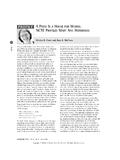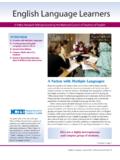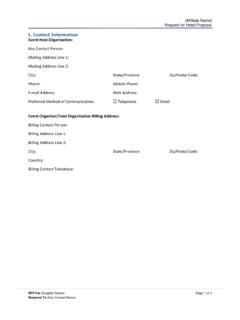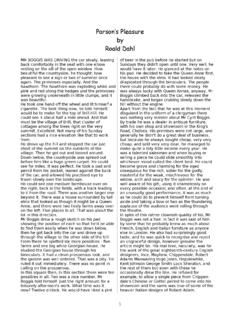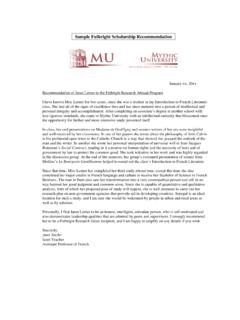Transcription of The Power of Pleasure Reading: What We Can Learn from …
1 Jeffrey D. Wilhelm and Michael W. Smith The Power of Pleasure The authors share findings from a recent study of teens reading : What We Can who freely select to read texts typically marginalized by Learn from the Secret schools (dystopia, vampire, romance, horror, fantasy), reading Lives of Teens revealing the distinct functional and psychological benefits of Pleasure reading . O ver the last 30- plus years, we've both had numerous conversations and sometimes even debates with parents, administrators, and other teachers about the value of the books that stu- dents most want to read and that they read with that would leverage and develop student reading and that would help students grow as readers and as human beings.
2 Sophisticated recent research clearly estab- lishes that potential for growth. Social Inequalities in Cognitive Scores at Age 16: The Role of reading the greatest joy and engagement. We confess that (Sullivan and Brown) draws on data collected in we've worried about some of the reading selections the 1970 British Cohort Study, which follows the our students as well as our own daughters have lives of more than 17,000 people born in England, made. We confess that we've been reluctant to em- Scotland, and Wales in a single week of 1970. After brace Pleasure as a goal of instruction, and of plea- doing a series of analyses, Sullivan and Brown come sure reading as an end in itself.
3 Up with a conclusion so important that we think it's But we also have to confess our amazement at worth quoting at length: the profound joy and zeal displayed by many of the Our findings .. [suggest] that children's leisure readers of texts so often marginalized and worry- reading is important for educational attainment inducing: romances, vampire stories, horror nov- and social mobility .. and suggest that the mech- els, dystopian fiction, and fantasy. We've both seen anism for this is increased cognitive development. many students who would spend hours upon hours Once we controlled for the child's test scores at reading outside school even as they often rejected age five and ten, the influence of the child's own the reading they were asked to do inside school.
4 We reading remained highly significant, suggesting wondered what these students were getting from that the positive link between leisure reading and their out- of- school reading of books that we would cognitive outcomes is not purely due to more able never deign to assign. So we decided to ask. Our children being more likely to read a lot, but that reading is actually linked to increased cognitive research (Wilhelm and Smith) focused on the na- progress over time. From a policy perspective, this ture and variety of the Pleasure adolescent readers strongly supports the need to support and encour- experienced as they read those marginalized genres.
5 Age children's reading in their leisure time. (37). What we found, in a nutshell, was that these genres brought their readers four distinct kinds of The increased cognitive processes is what accounts Pleasure : the Pleasure of play, intellectual Pleasure , for the surprising finding that leisure reading was social Pleasure , and the Pleasure of work, both func- also correlated with increased math performance! tional work and psychological inner work. Our data Little wonder that even in an age of account- strongly suggest that Pleasure has enormous Power ability there have always been advocates for prac- in fostering reading engagement and development.
6 Tices designed to foster reading Pleasure and the Yet Pleasure is not foregrounded in schools in ways development of lifelong readers (see, for example, English Journal (2016): 25 30 25. Copyright 2016 by the National Council of Teachers of English. All rights reserved. EJ July2016 2925 6/23/16. 7/11/2016 6:24AM. 11:37:25 PM. The Power of Pleasure reading : What We Can Learn from the Secret reading Lives of Teens Miller and Gallagher). Robert Alter's theoretical illusion that all is well in the best of all possible look at the high fun of reading literature (30) worlds (7). and Dennis J.
7 Sumara's exploration of what he calls Radway's data from her book reading the Ro- intertextual desire are important reminders of the mance: Women, Patriarchy, and Popular Literature pleasures that reading can bring. However, the re- demonstrates that such charges are unfounded. She search community hasn't pursued this line of in- found that some romance reading at least manages quiry. Although research on reading interests and to help women address and even minimally trans- motivation abounds, as Christina Clark and Kate form the conditions of their daily existence (8). In Rumbold note, the investigation of reading for other words, readers are not passive, but active and Pleasure has not been a research priority (9).
8 Often transformative in the ways they transact with texts and use them. Society has, she argues, failed to detect the essential complexity that can char- Why Is Pleasure Neglected? acterize the interaction between people and mass Why are the pleasures of reading so neglected? One produced culture (9) including, we would argue, reason may be because we tend to focus instead on popular books for adolescents. the Power of reading . reading is certainly necessary We think that research into the reading of to doing school, to the navigation of modern life, popular texts, as well as into the experience of plea- to functioning as an informed sure, might be lacking precisely because of the prej- Why not ask young democratic citizen, to work- udices Radway describes.
9 In keeping with the spirit people directly what they ing in a knowledge economy. of her research, we thought: Why not ask young get from their reading Using the Internet requires people directly what they get from their reading of of popular adolescent significant kinds of reading of popular adolescent texts? Why not ask them how texts? Why not ask them various kinds of multimodal, they experience and use these texts? And that is how they experience and multimedia, and hybridized what we did. texts working together. Being use these texts? informed, especially about nu- Our Method anced and complex issues, requires deep reading .
10 Literacy is essential not only to accessing informa- The students who participated in the study that tion and staying current, it is also essential to doing we report here were eighth graders who nominated work in the world. themselves as passionate readers of a kind of text Janis Radway explores another possibil- ity. In her 1986 article reading Is Not Eating: Mass- Produced Literature and the Theoretical, Methodological, and Political Consequences of a Metaphor, she argues that popular culture texts, the kinds of texts in which most readers take plea- sure, are comforting and sustaining to their readers.

